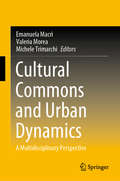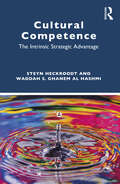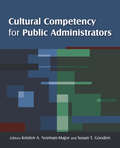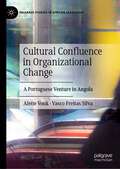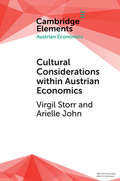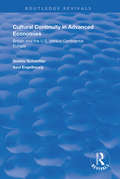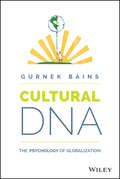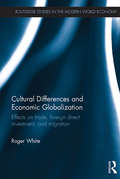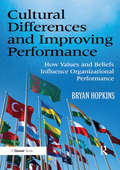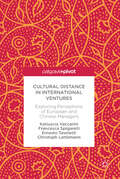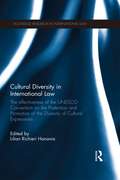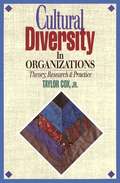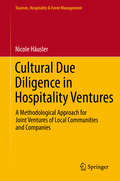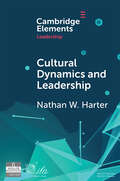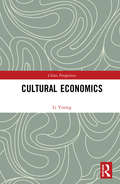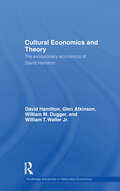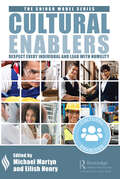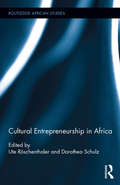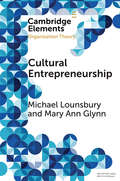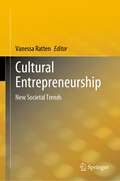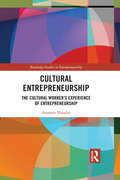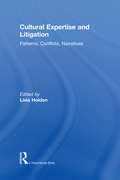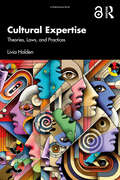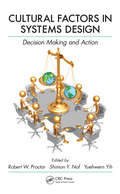- Table View
- List View
Cultural Commons and Urban Dynamics: A Multidisciplinary Perspective
by Emanuela Macrì Valeria Morea Michele TrimarchiToday, cities are being intensively reshaped by unexpected dynamics. The rise and growth of the digital economy have fundamentally changed the relationship between the urban fabric and its resident community, overcoming the conventional hierarchy based on production priorities. Moreover, contemporary society discovers new labour conditions and ways of satisfying needs and desires by developing new synergies and links. This book examines cultural and urban commons from a multidisciplinary perspective. Economists, architects, urban planners, sociologists, designers, political scientists, and artists explore the impact and implications of cultural commons on urban change. The contributions discuss both cases of successful urban participation and cases of strong social conflict, while also addressing a host of institutional contradictions and dilemmas. The first part of the book examines urban commons in response to institutional constraints from a theoretical point of view. The second and third parts apply the theories to case studies and discuss various practices of sustainable planning and re-appropriation in the urban context. In closing, the fourth part develops a new urban agenda as artists imagine it. This book will appeal to scholars interested in the social, economic and institutional implications of cultural and urban commons, and provide useful insights and tools to help local governments and policymakers manage social, cultural and economic change.
Cultural Competence: The Intrinsic Strategic Advantage
by Waddah S. Ghanem Al Hashmi Steyn HeckroodtTaking a strategic imperative perspective, this book introduces business leaders to a key differentiator that contributes to competitive advantage and financial sustainability: cultural competence. In a fast-changing and globalized world where organizations are being forced to rethink their strategies, understanding present and future environmental, social, and economic challenges is fundamental to creating a resilient and value-creating business. Combining experience and reflection, this book addresses concepts of organizational cultural competence as an internal differentiator and source of competitive advantage. Most organizations approach differentiation as an external feature of product and/or service delivery. Whereas these are open to imitation, cultural competence, as the internal DNA of an organization, is much more difficult, if not impossible, to imitate. The authors bring to bear their years of experience in corporate roles and as entrepreneurs and academics, sharing views and experiences based on research but also on primary examples, meta-insights, and real-world case studies. Senior leaders and consultants across industries, as well as students of strategy and leadership development, will value this serious and comprehensive guide that explains the importance of cultural competence as a strategic advantage in a global market.
Cultural Competency for Public Administrators
by Susan T Gooden Kristen A. Norman-MajorWith a focus on a broad spectrum of topics--race, ethnicity, gender, disability, and sexual orientation at the federal, tribal, state, and local levels--this book equips readers to better understand the complex, real-world challenges public administrators confront in serving an increasingly diverse society.The book's main themes include: What is cultural competency and why is it important? Building culturally competent public agencies; Culturally competent public policy; Building culturally competent public servants; How do agencies assess their cultural competency and what is enough? PA scholars will appreciate the attention given to the role of cultural competency in program accreditation, and to educational approaches to deliver essential instruction on this important topic. Practitioners will value the array of examples that reflect many of the common trade offs public administrators face when trying to deliver comprehensive programs and services within a context of fiscal realities.
Cultural Competency for Public Administrators (4x45)
by Susan T Gooden Kristen A. Norman-MajorWith a focus on a broad spectrum of topics--race, ethnicity, gender, disability, and sexual orientation at the federal, tribal, state, and local levels--this book equips readers to better understand the complex, real-world challenges public administrators confront in serving an increasingly diverse society. The book's main themes include: What is cultural competency and why is it important? Building culturally competent public agencies; Culturally competent public policy; Building culturally competent public servants; How do agencies assess their cultural competency and what is enough? PA scholars will appreciate the attention given to the role of cultural competency in program accreditation, and to educational approaches to deliver essential instruction on this important topic. Practitioners will value the array of examples that reflect many of the common trade offs public administrators face when trying to deliver comprehensive programs and services within a context of fiscal realities.
Cultural Confluence in Organizational Change: A Portuguese Venture in Angola (Palgrave Studies in African Leadership)
by Alette Vonk Vasco Freitas SilvaThis book examines the challenges of intercultural management in sub-Saharan Africa. It presents a case study of Vasco Silva, a Portuguese businessman who established a successful business in Luanda, Angola. After four years of growth, Silva encounters a culture shock due to a wild strike by his employees. He embarks on a deep cultural exploration using the Hofstede 6D model and the Toyota-management tool Genchi Genbutsu (go and see for yourself). Gradually, Silva gains an understanding of effective leadership in the Angolan context, unraveling important features of local culture and initiating an organizational change project. This work contributes to the ongoing discourse in African management literature, particularly regarding the integration of modern and contemporary traditional organizational and leadership concepts. It responds to the demand for descriptive accounts of hybrid case studies of confluencing cultures. Scholars of African management philosophy and business leaders can utilize this case study to explore indigenous African notions in a business setting, demonstrating the performative characteristics of local leadership forms and the adaptability required for success in foreign business environments
Cultural Considerations within Austrian Economics (Elements in Austrian Economics)
by Virgil Storr Arielle JohnIncreasingly, economists realize that a deeper understanding of culture can improve their insights into the most important questions in economics. The Austrian school of political economy, which has always taken economics to be a science of meaning, and therefore, a science of culture, offers a unique approach to the study of culture in economic life. We consider three important differences between these Austrian and non-Austrian approaches: the Austrian focus on culture as meaning rather than culture as norms, beliefs, or attitudes; the Austrian emphasis on culture as an interpretative lens rather than as a tool or form of capital; and the Austrian insistence that cultural analysis be a qualitative exercise rather than a quantitative one. We also examine Geertz's description of culture, Gadamer's approach to hermeneutics, and Weber's interpretative sociology, demonstrating their connections to the Austrian approach and offering examples of what Austrian cultural economics can look like.
Cultural Continuity in Advanced Economies: Britain and the U.S. Versus Continental Europe (Routledge Revivals)
by Gustav SchachterOriginally published in 2005. In the past three centuries Britain, Continental Europe and the United States have all experienced remarkable continuity in terms of the character and nature of the relations between the State and the economy. In a fascinating and eminently readable account, this book examines the significance of ideology in the formation of economic policy in the two groups of countries, comparing and contrasting the minimalist state-ownership societies of Britain and the United States with the interventionist states of Continental Europe. The book uncovers a continued contrast between the economic and social individualism of Britain and the United States, and the reliance on the State typical of nations in Continental Europe. The readership will benefit from a clearer understanding of the varying degrees of intervention in both the domestic and international economic policies employed, and the illuminating comparisons between the Continentals and the more market orientated nations of Britain and the United States.
Cultural DNA
by Gurnek BainsDevelop deeper cultural intelligence to thrive in a globalized world. Cultural DNA is a thought provoking book for successful engagement with cultures around the world. Written by Gurnek Bains, founder and chairman of a global business psychology consultancy, this book guides leaders through the essential soft skills required to get under the skin and engage an increasingly connected world. Presenting ground breaking original research and the latest evidence from neuroscience, behavioral genetics, and psychology, the deepest instincts of eight key global cultures are dissected. Readers will understand the psychological themes at play in regions such as the U.S., Latin America, Europe, China, India, the Middle East, Sub-Saharan Africa and Australia. Additionally, an extensive database of 30,000 leaders provides insights to inform the reader. The book addresses questions such as: What are the challenges for leaders from different regions as they move into onto the global stage? Why are Americans so positive? Why is China a world leader in manufacturing and India in IT? Why do overseas firms struggle in the U.S. market place? What are the emotional forces driving current events in the Middle East? Each culture has attributes that developed over thousands of years to address unique environmental challenges. This DNA drumbeat from the past reverberates through each society affecting everything. As globalization marches on we can also learn important lessons from the world's distinct societies. Globalization demands that cultures learn to work within each other's needs and expectations, and the right mix of people skills, business acumen, and cultural awareness is key. Business and Political leaders will understand how each regions' cultural DNA influences: Its economic and political institutions. People's underlying consumer psychology. The soft skills needed to lead in that environment. How to best release people's potential. The issues that need to be managed to anticipate and solve problems before they arise Every now and again a new book comes along, that is a must read: Malcolm Gladwell's Tipping Point or a Seth Godin's Tribes. Cultural DNA by Gurnek Bains, by virtue of its depth, originality and ambition, is that very book for all global leaders.
Cultural Differences and Economic Globalization: Effects on trade, foreign direct investment, and migration (Routledge Studies in the Modern World Economy)
by Roger WhiteEconomic globalization is the process of increased integration among nations, characterized and fostered by three elements of international trade- goods and services, international capital flows, and international migration. In recent decades, international economic integration has increased both in depth (more pronounced bilateral connections) and in breadth (connections have become more commonplace), thus, the global economy has become increasingly integrated. Societies receive tremendous net benefits from economic globalization, however, accessing these benefits may be limited by cross-societal cultural differences. This book examines cultural differences as a potential impediment to economic integration. Relying on rigorous statistical and econometric techniques, the analyses indicate that higher transaction costs, due to greater cultural distance, inhibit both the volume of trade flows and the successful completion of trade deals. Cultural distance appears to reduce foreign direct investment, as well as divert investment to less culturally-distant destinations. This book finds a negative relationship between migration flows and cultural distance. It considers the common criticism that repeated and intensified integration diminishes cultural differences, resulting in cultural homogeneity. This book offers the first comprehensive examination of the relationships between cross-societal cultural differences and economic globalization. It will be of great interest to scholars and students who study globalization, international economics, and cultural studies.
Cultural Differences and Improving Performance: How Values and Beliefs Influence Organizational Performance
by Bryan HopkinsOne of the most significant and yet largely overlooked factors influencing performance and workplace problem solving in many large organizations is that of national culture. Managers, and the organizations for which they work, need to be able to understand the influence of cultural values and beliefs on performance in order to identify appropriate solutions; strategies appropriate in one part of the world may be ineffective or even counter-productive in another. Bryan Hopkins' ground breaking book relates the concept of cultural dimensions, as developed by writers such as Hofstede and Trompenaars, to the performance engineering approaches of Gilbert and Mager and Pipe, to show how strategies for solving workplace performance problems need to consider the cultural composition of the workforce. It then provides a practical structure for problem solving within the context of an international, multi-cultural environment. This is a book for both managers working in an international setting or for those in national organizations who are dealing with the challenge of culturally diverse workforces. It's also a book for governments seeking to understand the potential implications of national culture on civilian or even military interventions.
Cultural Distance in International Ventures: Exploring Perceptions of European and Chinese Managers
by Christoph Lattemann Katiuscia Vaccarini Francesca Spigarelli Ernesto TavolettiThis book uses the concepts of both cultural and psychic distance to analyse managers' perceptions in international business settings, with a specific focus on European and Chinese ventures in the green technology industry. The key concept of 'distance' refers to the variations of cultures, languages, business practices, policies and regulations that distinguish different countries. Offering empirical case studies and theoretical refinements on how scholars can conceptualise and operationalise the psychic distance construct, the authors provide a comprehensive examination of European foreign direct investment (FDI) to China and Chinese FDI to Europe. Contributing to the Marie Curie scheme, Partnering Opportunities between Europe and China in the Renewable Energy and Environmental iNdustries (POREEN), this book is an invaluable read for managers and practitioners.
Cultural Diversity in International Law: The Effectiveness of the UNESCO Convention on the Protection and Promotion of the Diversity of Cultural Expressions (Routledge Research in International Law)
by Lilian Richieri HananiaThe UNESCO Convention on the Protection and Promotion of the Diversity of Cultural Expressions (CDCE) was adopted in 2005 and designed to allow States to protect and promote cultural policies. This book examines the effectiveness of the CDCE and offers ways by which its implementation may be improved to better attain its objectives. The book provides insight in how the normative character of the CDCE may be strengthened through implementation and increasingly recurrent practice based on its provisions. Hailing from various fields of international law, political and social sciences, the book’s contributors work to promote discussions on the practical and legal influence of the CDCE, and to identify opportunities and recommendations for a more effective application. Part One of the book assesses the effectiveness of the CDCE in influencing other areas of international law and the work conducted by other intergovernmental organizations through the recognition of the double nature (cultural and economic) of cultural goods and services. Part Two focuses on the practice of the CDCE beyond the recognition of the specificity of cultural goods and services in international law by addressing the CDCE’s call for greater international cooperation and stronger integration of cultural concerns in development strategies at the national and regional levels. The book will be of great use and interest to academics and practitioners in law, social and political sciences, agents of governmental and international organizations, and cultural sector stakeholders.
Cultural Diversity in Organizations: Theory, Research and Practice
by Taylor Cox--Cultural Diversity in Organizations provides the most comprehensive base of knowledge yet assembled on the topic of cultural diversity. It captures the enormous complexity of the topic by examining diversity on three levels of analysis-individual, group, and organizational and addressing diversity from multiple perspectives-theory, research, and practice. Winner of the 1994 George R. Terry Book Award given by the National Academy of Management to "the book judged to have made the most outstanding contribution to the advancement of management knowle
Cultural Due Diligence in Hospitality Ventures
by Nicole HäuslerThis book introduces readers to a powerful method for cross-cultural due diligence in mergers and organizational collaborations. It employs the context of joint ventures between local communities and companies in the domain of hospitality in emerging tourism destinations. The book first analyzes the impact of cultural diversity in mergers between local communities and the private sector, revealing the characteristics and functions of culture and paying specific attention to the roles of organizational and community cultures in hospitality. In two subsequent methodological chapters the book presents a theoretical framework for cultural due diligence and identifies the principal actors, technical aspects and core principles. On the basis of a separate case study from northern Thailand, the book provides an example of cultural context analysis and presents the findings and results. In a concluding chapter the book presents an outlook on further research and development in this field.
Cultural Dynamics and Leadership: An Interpretive Approach (Elements in Leadership)
by Nathan W. HarterThe intersection of leadership and culture is undertheorized. This Element looks behind familiar titles in leadership at materials from anthropology, sociology, and history to gain a more nuanced understanding of culture. Of particular relevance is an interpretive approach, elaborated in the works of Simmel, Cassirer, Ortega y Gasset, and Gadamer. A five-part schema examines permutations pertaining to the relationship between culture and leadership – as separate, conflicting, derivative, or engaged – with the most attractive being the possibility that leadership and culture are mutually constituting. To explain cultural change, Ortega y Gasset suggested as a unit of analysis the idea of a generation, illustrated in a historical account of translating the Bible. Archer proposed as a mechanism for cultural change the idea of social morphogenesis, which this Element applies to evolving issues of race in the civic order. This process illustrated in the thinking of pundit William F. Buckley, Jr.
Cultural Economics (China Perspectives)
by Li YiningCulture is a priceless inheritance and source of wellbeing that is of immense value to humankind. Cultural economics set out to examine the nature and social benefits of cultural products and phenomena as they exist in the market. This volume is the masterpiece of Li Yining, one of the best-known Chinese economists, active in devoting his attention to the role of culture in the economy since the 1950s. Considering the importance of culture in the development of socialism with Chinese characteristics, the author combines cultural history, economic history, and the history of economic thought to produce unique perspectives. This book not only introduces the central concepts of cultural economics and the culture industry, but proposes several groundbreaking views that greatly influenced the culture policies of China, including cultural adjustment, cultural confidence, and cultural checks and balances. Researchers and students of economics, cultural studies, and Chinese politics, as well as policy makers, will benefit from this volume.
Cultural Economics and Theory: The Evolutionary Economics of David Hamilton (Routledge Advances in Heterodox Economics #11)
by David Hamilton Glen Atkinson William M. Dugger William T. Waller Jr.David Hamilton is a leader in the American institutionalist school of heterodox economics that emerged after WWII. This volume includes 25 articles written by Hamilton over a period of nearly half a century. In these articles he examines the philosophical foundations and practical problems of economics. The result of this is a unique institutionalist view of how economies evolve and how economics itself has evolved with them. Hamilton applies insight gained from his study of culture to send the message that human actions situated in culture determine our economic situation. David Hamilton has advanced heterodox economics by replacing intellectual concepts from orthodox economics that hinder us with concepts that help us. In particular, Hamilton has helped replace equilibrium with evolution, make-believe with reality, ideological distortion of government with practical use of government, the economy as a product of natural law with the economy as a product of human law and, last, he has helped us replace the entrepreneur as a hero with the entrepreneur as a real person. These articles provide an alternative to the self-adjusting market. They provide an explanation of how the interaction of cultural patterns and technology determine the evolutionary path of the economic development of a nation. This is not a simple materialist depiction of economic history as some Marxists have advocated, instead Hamilton treats technology and culture as endogenous forces, embedded and inseparable from each other and therefore, economic development. This volume will be of most interest and value to professional economists and graduate students who are looking for an in-depth explanation of the origins and significance of institutional economics.
Cultural Enablers: Respect Every Individual and Lead with Humility (The Shingo Model Series)
by Michael Martyn and Eilish HenryWhen done well, implementing the principles found in the Cultural Enablers dimension of the Shingo Model leads to an organizational culture that assures a safe environment, places a special emphasis on the development of its people, and engages and empowers everyone in the pursuit of continuous improvement. This fifth book of the Shingo Model series is laid out in a format similar to a Shingo workshop. You’ll find chapters devoted to both of the principles, examples from organizations from around the world, an overview of key systems and ideal behaviors, and a few expanded case studies to aid your learning. Cultural Enablers is designed to help all organizations on their journey towardexcellence. You will better understand the concepts of respect and humility, and how these two principles can be brought to life through the creation of your own ideal behaviors. Although the systems listed here are not exhaustive, you’ll discover an overview of a few systems that are critical to developing a world-class culture of continuous improvement that is characterized by high levels of engagement and daily problem solving.
Cultural Entrepreneurship in Africa (Routledge African Studies #20)
by Ute Röschenthaler Dorothea SchulzThis book seeks to widen perspectives on entrepreneurship by drawing attention to the diverse and partly new forms of entrepreneurial practice in Africa since the 1990s. Contrary to widespread assertions, figures of success have been regularly observed in Africa since pre-colonial times. The contributions account for these historical continuities in entrepreneurship, and identify the specifically new political and economic context within which individuals currently probe and invent novel forms of enterprise. Based on ethnographically contextualized life stories and case studies of female and male entrepreneurs, the volume offers a vivid and multi-perspectival account of their strategies, visions and ventures in domains as varied as religious proselytism, politics, tourism, media, music, prostitution, funeral organization, and education. African cultural entrepreneurs have a significant economic impact, attract the attention of large groups of people, serve as role models for many youths, and contribute to the formation of new popular cultures.
Cultural Entrepreneurship: A New Agenda for the Study of Entrepreneurial Processes and Possibilities (Elements in Organization Theory)
by Mary Ann Glynn Michael LounsburyThis Element provides an overview of cultural entrepreneurship scholarship and seeks to lay the foundation for a broader and more integrative research agenda at the interface of organization theory and entrepreneurship. Its scholarly agenda includes a range of phenomena from the legitimation of new ventures, to the construction of novel or alternative organizational or collective identities, and, at even more macro levels, to the emergence of new entrepreneurial possibilities and market categories. Michael Lounsbury and Mary Ann Glynn develop novel theoretical arguments and discuss the implications for mainstream entrepreneurship research, focusing on the study of entrepreneurial processes and possibilities.
Cultural Entrepreneurship: New Societal Trends
by Vanessa RattenCultural entrepreneurship uses culture as a way to understand innovative business ventures. Culture in this edited book involves the beliefs and values associated with certain forms of behaviour. This means the way individuals are involved in business ventures is based on their cultural ideas. This edited book focuses on how cultural entrepreneurship is an important way to understand how cultural products and services such as art, food, music and literature influence the development of business ventures. Thereby highlighting the interesting and unique way cultural ideas are embedded in entrepreneurial activities.
Cultural Entrepreneurship: The Cultural Worker’s Experience of Entrepreneurship (Routledge Studies in Entrepreneurship)
by Annette NaudinThis book explores the lived experience of cultural entrepreneurship examining the challenges associated with cultural labour including the insecurities of managing precarious working conditions. Drawing on interviews conducted with cultural workers, Cultural Entrepreneurship focuses on how individuals articulate their experience of entrepreneurship in the cultural and creative industries. Noting the importance of place, the local cultural milieu is examined as a means of situating entrepreneurial practices through cultural and enterprise policies, local networks, and significant relationships. Within this framework, the cultural entrepreneurs’ stories reveal means of subverting or re-interpreting identities and the possibility for ‘rethinking cultural entrepreneurship.’ Aimed at researchers, academics and students investigating cultural entrepreneurship, cultural policy and cultural labour, Cultural Entrepreneurship will additionally be of value to creative industry consultants, cultural policymakers, and those setting up creative enterprises. Researchers from fields such as geography, investigating different aspects of the cultural industries in relation to cultural policy and place, will also find this book to be a useful contribution.
Cultural Expertise and Litigation: Patterns, Conflicts, Narratives
by Livia HoldenCultural Expertise and Litigation addresses the role of social scientists as a source of expert evidence, and is a product of their experiences and observations of cases involving litigants of South Asian origin. What is meant in court by "culture," "custom" and "law"? How are these concepts understood by witnesses, advocates, judges and litigants? How far are cross-cultural understandings facilitated - or obscured - in the process? What strategies are adopted? And which ones turn out to be successful in court? How is cultural understanding – and misunderstanding – produced in these circumstances? And how, moreover, do the decisions in these cases not only reflect, but impact, upon the law and the legal procedure? Cultural Expertise and Litigation addresses these questions, as it elicits the patterns, conflicts and narratives that characterize the legal role of social scientists in a variety of de facto plural settings – including immigration and asylum law, family law, citizenship law and criminal law.
Cultural Expertise: Theories, Laws, and Practices
by Livia HoldenThis book provides a comprehensive examination of the subject of cultural expertise, addressing its theoretical developments, ethical debates, regulatory frameworks, and practices.Elaborating the theory and practice of cultural expertise as it crosscuts legal systems and disciplinary boundaries, the book offers a thorough understanding of the scope, application, and impact of cultural expertise in various socio-legal contexts. The book offers theoretical and practical tools to those with academic or professional interests in cultural expertise, detailing its scope, application, and impact. Throughout, cultural expertise is positioned as a vital interdisciplinary concept, bridging the gap between theoretical frameworks and practical solutions for complex social problems that transcend jurisdictional boundaries, legal fields, and disciplinary categories.This book will appeal to academics and students in the areas of the socio-legal studies, international and comparative law, and cultural anthropology, as well as members of the legal professions and policy-makers who engage with the analysis of laws and cultures.
Cultural Factors in Systems Design: Decision Making and Action (Industrial and Systems Engineering Series)
by Shimon Y. Nof Robert W. Proctor Yuehwern YihCultural factors, in both the narrow sense of different national, racial, and ethnic groups, and in the broader sense of different groups of any type, play major roles in individual and group decisions. Written by an international, interdisciplinary group of experts, Cultural Factors in Systems Design: Decision Making and Action explores innovation
